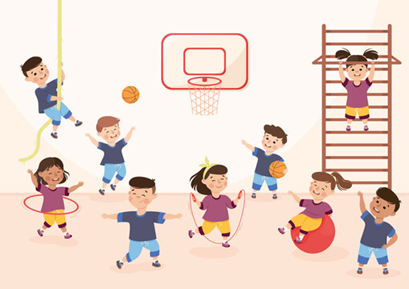Physical Education (PE)

Love 
At All Saints’ we aspire our children to be healthy and active by encouraging and developing a love of physical education. Our PE curriculum contributes to each child’s physical, cognitive, social and emotional development, as well as their spiritual, moral and cultural development. Our children learn that being active has the power to teach positive values and enrich lives.
Compassion 
We strongly encourage children to recognise the strength in their own capabilities and in others’ and celebrate achievements both big and small. We aspire our children to display empathy towards their peers by showing good sportsmanship qualities at all times.
Koinonia 
We encourage children to feel a part of a team as this enables them all to flourish as a family and to ensure everyone feels included and valued. We aim to educate how being active can build friendships, self-esteem and assemble a tight-knit community. We aim for the lessons learnt about teamwork in a sporting environment to translate to all walks of life.
Endurance 
Our PE curriculum encourages children to demonstrate endurance when exploring the body’s capabilities. Allowing children to evaluate their active journey allows them to build a positive mindset and promotes progression. Although they may come across challenges, we teach children that challenges are a part of life’s journey and educate ways on how to promote perseverance. We encourage children to focus not just on the outcome but instead, the journey which led us to it.

At All Saints Church of England Primary School, our Physical Education (PE) curriculum is designed with a holistic approach, aiming to nurture the physical, social, and emotional well-being of our students. Our intent is not only to foster a love for physical activity but also to instil values that seamlessly integrate into everyday life, guided by the principles of our school’s ethos. Our PE curriculum prioritizes the development of fundamental movement skills, coordination, and physical fitness. Through a diverse range of activities, we seek to enhance each child’s physical capabilities, promoting a healthy and active lifestyle from an early age. We are committed to providing a PE department that is inclusive and celebrates diversity. Students will engage in activities that cater to different abilities and interests, fostering an environment where every child feels valued and encouraged to participate. Beyond physical skills, our PE curriculum places a strong emphasis on character development, constantly trying to mould our students into the best people they can be. Teamwork, resilience, and leadership are woven into our lessons, empowering students with essential life skills that extend far beyond the sports field. Aligned with the ethos of All Saints Church of England Primary School, our PE department integrates Christian and moral values into its teachings. Love, koinonia, endurance and compassion are integral components, creating an environment where students learn to appreciate the worth of every individual. Physical education at All Saints extends beyond the classroom, encouraging students to engage with the local community through sports events, charity initiatives, and collaborative projects. We believe in fostering a sense of responsibility and connection to the wider world. The PE department at All Saints aims to contribute to the development of well-rounded individuals. Our curriculum not only focuses on physical skills but also on the mental and emotional aspects of each child, promoting a sense of self-awareness and positive mental health. PE at All Saints Primary School is designed to go beyond the traditional boundaries of physical education. It is a key component in the holistic development of our students, imparting skills, values, and a genuine passion for a healthy, active, and socially responsible lifestyle.
EYFS 
Physical Development
Incorporate a mixture of movement, stability, body awareness, and body control activities into one structured lesson a week.
Sports Day Prep
Practice the events for sports day, focussing on completing the specific events
Year 1 
Games: Children develop basic throwing and catching skills
Hockney: Dribbling, Movement/Coordination
Football: Dribbling/movement with a ball; Eg in and out of cones
Athletics: Running, throwing, jumping, catching, balancing and simple competitions
Basketball: Skills development – dribbling, shooting.
Dance: Moving confidently and safely, exploring basic body actions (traveling, jumping, balancing)
Games Activities
Tennis: Bouncing, throwing, balancing on racket, bouncing on racket, rallies
Multi-skills: Hula-hooping, balancing bean bags, spot jumping, ball bouncing
Gymnastics: Children investigate movement, stillness, and how to find space safely
Year 2 
Games: Ball/movement skills with greater accuracy
Hockney: Dribbling, Movement/Coordination, Shooting
Football: Ball control – striking and moving
Athletics: Running, throwing, catching, balancing and simple competitions
Basketball: Skills development – dribbling, shooting
Dance: To explore, remember, repeat and link a range of actions with coordination, control & awareness
Games Activities
Tennis: Bouncing, throwing, balancing on racket, bouncing on racket, rallies
Multi-skills: Hula-hooping, target throwing, spot jumping, ball bouncing, cone flip, obstacle course
Gymnastics: Increase confidence in basic gymnastic skills such as rolling, jumping, travelling and balancing
Year 3 
Tag rugby: Passing, catching and evading an attacker.
Basketball: Skills development – dribbling, shooting.
Football: Ball control – striking and moving.
Netball: Passing, pivoting, jumping, finding space.
Rounders: Throwing, catching, striking, fielding.
Tennis: Bouncing, throwing, bouncing on racket, rallies.
Cricket: Bowling, batting, wicket keeping, accuracy
Athletics Unit 1: Developing good basic running skills, jumping skills and throwing techniques.
Athletics Unit 2: Sprint relays, middle & long distance running, standing long; triple & vertical jump, shot put
Hockey: Dribbling, Movement/Coordination, Shooting
Dance UNIT 1- Egyptian Dancing (Ancient Egypt topic link): Focus on creating, adapting & linking a range of actions to develop an awareness of the historical and cultural origins of Egyptian dances.
Dance UNIT 2- Bollywood Dancing: Focus on performing dances focussing on creating, adapting and linking a range of dance actions, while developing an awareness of the historical and cultural origins of Bollywood dances.
Year 4 
Tag rugby: Skill development – technique + teamwork
Basketball: Skills development – dribbling, shooting
Football: Developing power, accuracy and teamwork
Netball: Passing, pivoting, jumping, finding space.
Rounders: Bowling, fielding, tactics and technique
Tennis: Developing technique, serving and rallying
Dance UNIT 1- Tudors Dancing (Wimbledon Past and Present Topic link): Focus on creating characters and narrative through movements and gestures to develop an awareness of the historical and cultural origins of Tudor dances.
Swimming
Cricket: Bowling overarm, fielding, striking.
Dance UNIT 2- Line Dancing: Focus on creating characters and narrative through movements and gestures to develop an awareness of line dancing. Children work in pairs or groups to develop a dance routine to perform.
Hockey: Learning simple attacking techniques, learn how to defend goals in uneven sided matches.
Athletics Unit 1: Sprint relays, middle & long distance running, standing long; triple & vertical jump, shot put.
Athletics Unit 2: Children develop good running, jumping and throwing skills focusing on distance and time.
Year 5 
Tag rugby: Attacking and defending in a match scenario.
Basketball: Skill development, teamwork and tactics
Football: Skills development – attacking and defending
Netball: Technique, footwork, boundaries + positions
Rounders: To develop a range of skills to help in a game, including bowler, backstop, fielder and batter.
Tennis: Serving, accuracy and tactics in match scenario.
Sports Leadership Training (MSSP Scheme of work): Leading, differentiating and organising activities
Cricket: Bowling, batting, wicket keeping, accuracy
Both classes top up Swimming
Dance UNIT 1- Environment Dancing (Extreme Earth Topic link): Focus on different styles of dancing and dancing with other people.
Hockey: To develop skilful attacking and team play. Learning how to work as a team when attacking and defending.
Athletics Unit 1: Sprint relays, middle & long distance running, standing long; triple & vertical jump, shot put
Athletics Unit 2: Developing targets and improve performance, focussing on sprinting, relay races, long jump,
Year 6 
Tag rugby: Tactics- develop skills and work collaboratively as a team.
Basketball: Focus on skilful attacking and team play. Children learn to play as a team when attacking and explore ways to defend.
Football: Tactics, technique and teamwork.
Netball: Technique, footwork, boundaries + positions.
Rounders: Bowling, fielding, tactics and technique.
Tennis: Serving, volleying and working with a partner.
Cricket: Bowling, batting, wicket keeping, accuracy
Dance UNIT 1-Brazilain Dancing (South American Topic link): Focus on using different visual images to compose, perform and evaluate gestures, to develop an awareness of the historical and cultural origins of Brazilian dances.
Hockey: To improve match play and learn how to play as a team when attacking and defending.
Dance UNIT 2- African Dancing: (African History Topic link): Focus on using different visual images to compose, perform and evaluate gestures to develop an awareness of the historical and cultural origins of African dances.
Athletics Unit 1/2: Sprint relays, middle & long distance running, standing long; triple & vertical jump, shotput.
House style tournaments of the different sports taught throughout the year.
